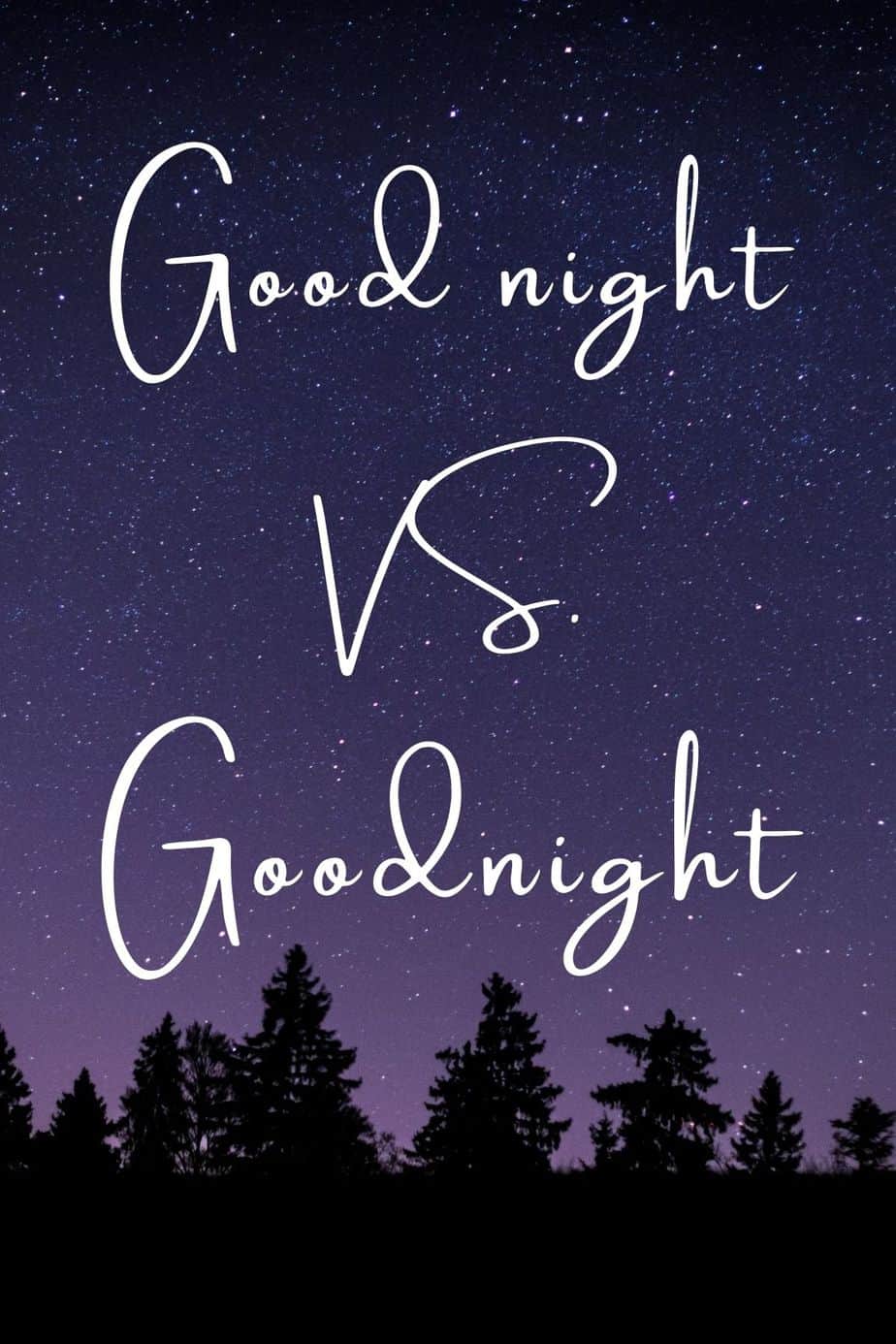Whether you’re a civilian or a soldier, you can always show respect to others by carrying out a certain greeting behavior, notwithstanding the language you use.
And, whether you run into a friend, a family member, a boss, or a colleague, your short and sweet greeting will always be appreciated and admired.
Although greeting people is pretty much a cakewalk in spoken contexts, spelling-related issues often come around and never fail to bother most, if not all, people in writing.
So, today, we will focus on making the expression “good night” (or “goodnight”) clearer in the mischievous world of written texts.
Shall we begin with a brief yet definitive answer?
Should “good night” be written in one or two words?
“Good night” and “goodnight” are acceptable spellings of the farewell expression used when bidding someone goodbye at night. However, “good night” is still largely considered as the standard spelling rather than “goodnight.” “Goodnight” is only typically used as an isolated exclamation phrase.
“Goodnight” vs. “Good night”: Inspecting the grammar
Time is a flat circle and language per se is inherently ambiguous. So, it is our responsibility as rational beings to make languages more organized and intelligible in actual usage.
Some of the most effective ways of making language more systematic and meaningful are through linguistic disciplines like syntax, morphology, semantics, and pragmatics among others.
But, whether we like it or not, some form of limitations pop out every once in a while in these fields, which makes languages even more interesting to explore.
One question that bothers many people, natives and non-natives alike, is whether “good night” should be spelt separately or as one word.
To understand the grammatical constructs that govern this very issue, let us have a look at each of these two expressions one at a time.
“Good night”: The grammar and usage of the two-word variant

Using “good night” as two separate words suggests the usage of a noun phrase that is composed of two parts. These parts include an adjective modifier and a noun.
In this noun phrase, the word “good” serves as an adjective that modifies the noun “night” by providing detail on its quality or attribute for the sake of making it more meaningful.
Example:
The example above shows how to particularly use the adjective “good” to modify the noun “night,” which follows the same rule when we say “good morning” or “good afternoon.”
However, it is also possible to use “good night” as an isolated exclamation expression to shorten or truncate longer statements.
As an example, if we are to put this exclamation in a larger chunk of information, particularly at the clausal level of sentences, we can simply think of the following statements:
Example 1:
Example 2:
However, since humans are intelligent enough to understand language use based on context, the complete versions of the statements above are oftentimes irrelevant.
Apparently, using “have a good night” or “good night” alone should suffice in most cases – not unless your addressee is on the other side of the world because it is likely daytime there.
For that matter, the two-word variant should be the default expression to use when making it part of a longer statement in formal writing contexts.
Furthermore, noun phrases can also denote possessions or a sense of ownership; this construct is known as the genitive case or simply possessive nouns in grammar.
When this concept is applied to “good night,” we may also form possessive noun expressions such as “a good night’s sleep” and “a good night’s rest.”
Therefore, we have to remember that the expression “have a good night’s sleep” is more grammatically correct than “have a good night sleep” despite the understandability of the latter.
To be more precise, the meaning “good sleep of a night” is suggested by the possessive noun phrase “a good night’s sleep.”
Examples:
Clearly enough, the same idea can meanwhile be applied to the phrase “two weeks’ notice” which also means “a notice of two weeks.”
Should you want to know more about possessive nouns, please feel free to refer to our other relevant resource material tackling whether “business’s” or “business’” is the right choice.
Now that the grammatical details of the two-word variant “good night” have been made laid out, let us also delve deeper into the one-word variant “goodnight.”
“Goodnight”: The grammar and usage of the one-word variant

Meanwhile, the one-word variant “goodnight” is simply considered as an alternative spelling for “good night.” This variant is largely used for practical and casual-language related reasons.
Resorting to the alternative spelling “goodnight” in writing suggests informal language use, which is still possible albeit non-standard.
“Goodnight” is predominantly used as an isolated remark as a result of shortening longer expressions like “you have a good night” or “I wish you a good night.”
Having said that, “good night” and “goodnight” are interchangeable when used as stand-alone exclamation expressions in written contexts.
Example:
To make things clearer in the context of the one-word variant “goodnight,” here are two more examples making use of it:
Examples:
This single-word variant is a result of the morphological process called “compounding” or the word-formation process based on two unlike words combined into one.
More particularly, “goodnight” is technically known as a “closed compound” type of word. This type can be made up of two or more words written as a single word to create new meaning.
Written as single items, words like “rainbow,” “peanut,” and “bedroom” are other common examples of closed compounds like “goodnight.”
Closed compounds are the most productive among other types like open compounds (written as separate words) and hyphenated compounds (written with dashes or hyphens).
“Ice cream,” “police officer,” and “Christmas tree” are open compounds, whereas “son-in-law,” “five-year-old,” and “great-grandfather” belong to the hyphenated type.
As has been noted earlier, “goodnight” is best reserved as an isolated or solitary farewell expression as opposed to being part of a larger clause.
However, on top of this usage, “goodnight” may also further function as a modifier for other nouns in sentence construction.
When this happens, its job is to identify the type of the noun being referred to. In simpler terms, it aims to answer the question “What type of noun is being pointed out?”
Apparently, nouns may also perform the job of adjectives when we create sentences.
Example:
As you may figure, the nominal word “goodnight” is used to identify the kind of “kiss” given to the indirect object “her” in the example above.
Was the kiss just a peck? Which part of the body was kissed? How did she react? Well, there’s no way for us to know the answers to these questions without further details.
However, what we do have the ability to know is that the “kiss” was given some time in the “evening” rather than the other times of the day like in the morning or afternoon.
By the way, people may have different definitions of the word “evening.” So, you may also want to discover what time evening is to understand it more deeply.
Furthermore, we do know that the “kiss” was also “good.” We get to understand the message this way particularly because of the presence of the word “goodnight” before the word “kiss.”
To make things even clearer, here are other examples that make use of “goodnight” as a noun modifier:
Examples:
Other examples of noun phrases that make use of nouns functioning as adjectives are “criminal lawyer,” “football player,” and “basketball coach.”
Other spellings of “good night” and “goodnight”
In some of your readings before, you must have encountered other variant spellings for “good night” and “goodnight” and wondered whether they are acceptable.
Just to be clear, “good night” is the standard spelling that should be used as a default expression in all cases, even as a stand-alone farewell expression.
On the other hand, the variant spelling “goodnight” should only be restricted either to the isolated use of the expression during farewells or as a noun that modifies another noun such as “kiss,” “message,” and “song.”
In even much less formal cases, though, variant spellings like “good nite,” “gudnite,” “gudnyte,” and even “g’nite” may also be observed.
These variations are used informally to appear more likeable and amiable, particularly by those people who share intimate relationships.
That said, these variant spellings are best avoided when communicating with authority figures like superiors, professors, and clients.

The other things you need to know about “good night” and “goodnight”
Now that we already know what the two-word variant “good night” and the single-word variant “goodnight” are used for, let us also take things to other perspectives.
Some people wonder whether “good night” and “goodnight” are called “greeting expressions.” Actually, they are more specifically classified as “farewell expressions” instead.
Another common farewell expression in English is “see you then” which is also used when parting ways with another person but expecting to see that person again.
Meanwhile, the Irish expression “top of the morning to you” is what we can consider more as a greeting remark instead.
“Good night” is more widely used than “goodnight” in the online corpora, thereby suggesting that the former is the standard choice, while the latter is less likely used in discourses.
For that matter, using “good night” instead of “good night” should less likely invite criticism and confusion among readers.
Alternative ways to say “good night” and “goodnight”
If you think using “good night” and “goodnight” are not that suitable or are very formulaic, you may also make use of other alternative expressions in place of the two.
Note that the examples below are arranged in fairly decreasing formality order.
Here are some of them:
Examples:
Conclusion
Language is alive and dynamic. Hence, language is expected to change over time due to contributing factors like culture, technology, academic research, and even politics.
In other words, language change happens for the purpose of meeting the needs or demands of its language users, who are also the very reason why languages exist.
This very notion makes certain greeting, or more specifically, farewell expressions like “good night” and “goodnight” interesting to discuss.
Frequently Asked Questions on “Should ‘Good Night’ be Written as One or Two Words”
Is it grammatically correct to say “a very good night”?
“A very good night” is a grammatically correct expression because it follows the established syntactic rules of the English language. This expression is used to describe the quality of the “night” to a high extent or degree.
What is the difference between “good night” and “good evening”?
While “good evening” is typically used before any form of interaction with another person starts, “good night” is more likely used when the interaction is about to end, particularly in the evening. In other words, “good evening” is more like a greeting expression, but “good night” is more of a farewell expression.
What are other examples of words that are commonly written either as one or two words?
“Feedback” and “to feed back,” “someday” and “some day,” “anymore and any more,” and “everyday” and “every day” are some other words that can be written either separately or as one word among others.

Hey fellow Linguaholics! It’s me, Marcel. I am the proud owner of linguaholic.com. Languages have always been my passion and I have studied Linguistics, Computational Linguistics and Sinology at the University of Zurich. It is my utmost pleasure to share with all of you guys what I know about languages and linguistics in general.

